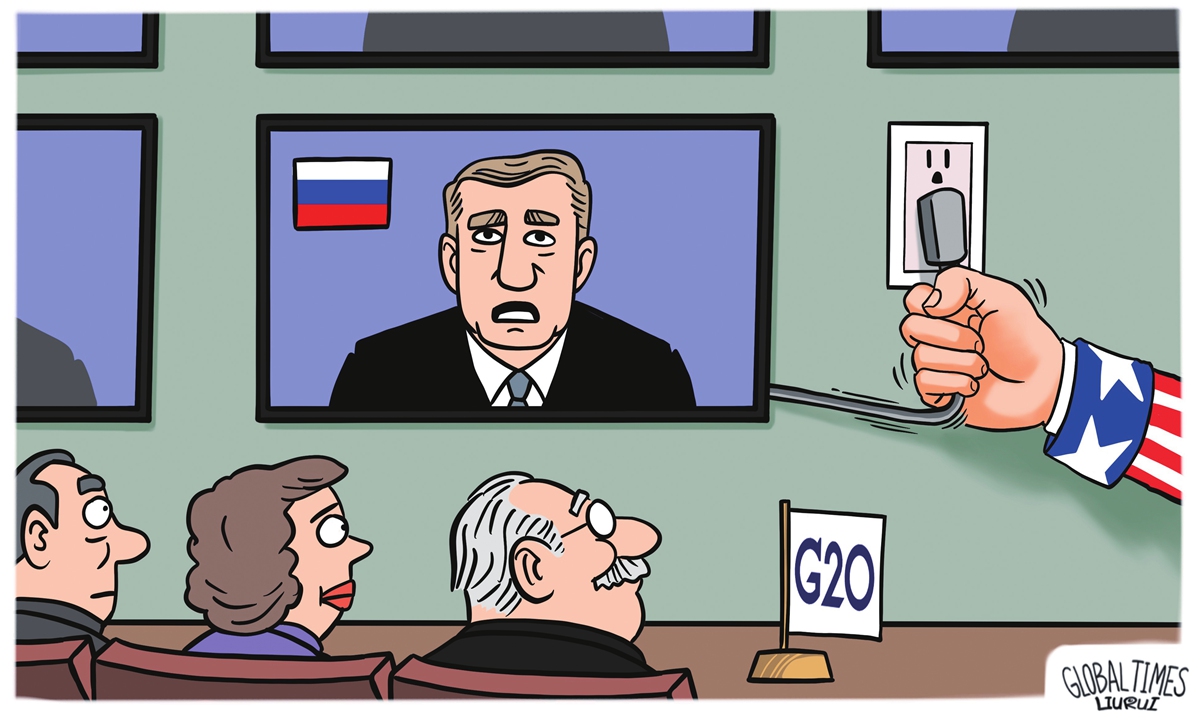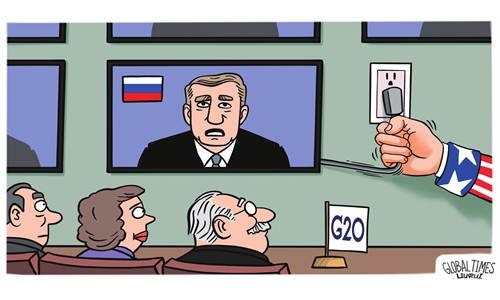Highly interconnected world makes West’s ‘expel Russia’ claim merely false proposition

Illustration: Liu Rui/GT
In the wake of the Russia-Ukraine conflict, the US and the West have imposed multiple sanctions on Russia and are attempting to isolate it internationally. The latest move was a call by the US and other Western countries on most G20 members to work together to kick out Russia from the group.The US' attempt to undermine international law and multilateral order through the Russia-Ukraine conflict is a trend that deserves serious condemnation from the international community. On April 7, the United Nations General Assembly (UNGA) adopted a resolution calling for Russia to be suspended from the Human Rights Council (UNHRC). Earlier, the US and some other Western countries also declared on different occasions that they would promote the suspension or expulsion of Russia in international organizations such as the World Trade Organization (WTO). Some American scholars even proposed to expel Russia from the UN Security Council (UNSC), tending to completely remove Russia from the existing international system. But the US' politicized moves have no solid legal basis nor are they widely responded by the international community.
In the first place, within the framework of international laws, it is difficult to find a legal basis for the expulsion of Russia. Membership in international organizations is not up to one or two countries to dictate, but to the constitution of the organizations if there is a related provision. For example, the WTO has no provision for expelling member countries, and the UN Charter has no provision for expelling permanent members of the UNSC. These international organizations, to expel Russia, need to amend the existing constitution and add relevant provisions. Besides, as the main forum for international economic cooperation, the G20 needs to follow the principle of consensus. Attempts to suspend membership are bound to undermine G20 unity and impact global economic governance, which is not in the interest of any party.
Secondly, the mainstream of the international community does not actually support the expulsion of Russia. Although the UNGA adopted a resolution to suspend Russia from the UNHRC, after the vote, Serbian President Alexander Vucic told Radio Television of Serbia, a public broadcaster in the country, "If we abstained, other countries will go against us and the pressure will increase." This fully demonstrates that under the coercion of the US and the West, much of the international community has been silenced. Against such a backdrop, to what extent can such voting results reflect the mainstream understanding of the international community?
Furthermore, in regard to some G20 members' boycott against Russia, China rejected calls for Russia to be expelled from the bloc. Indonesia has so far maintained that it still plans to invite the leaders of all 20 members to the upcoming G20 summit that will be hosted in Bali in November this year.
Brazilian Foreign Minister Carlos Franca said Brazil is "clearly opposed" to barring Russia from the G20. In the context of the discourse hegemony and selective reports by the US and the West, the voice calling for expelling Russia seems to be very loud, but in fact most countries are the "silent majority," and will inevitably refuse to be coerced into participating in this "Western game."
Third, international organizations are reluctant to follow suit. In the context of the prolonged pandemic and intensified conflicts, what international organizations urgently need is solidarity and cooperation to overcome difficulties, rather than widen the gap and deepen the estrangement. Therefore, it is not difficult to understand that few international organizations openly support the expulsion of Russia.
In short, "expelling Russia" out of the international system is to a large extent just a false proposition made by some American and Western politicians. The reality is that economic globalization has made the international community highly interconnected. This move by the US will not only tear apart the international system, but will not help resolve the current Ukraine crisis. It's not in line with the general trend of the globalization era. After all, the times in which one or a few countries have the final say has passed. The US and the West should carefully reflect on whether they are qualified with the power to give orders to other countries.
The author is an observer of international affairs. opinion@globaltimes.com.cn


